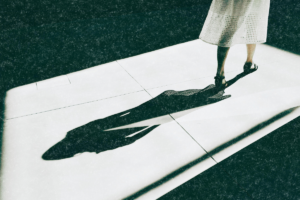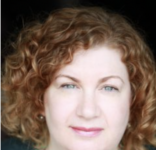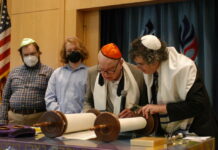
Laurel Snyder
I remember that she wore a white silk suit and an emerald green shirt. She looked beautiful, my mother, standing in the center aisle of the synagogue, at my bat mitzvah. I remember staring out at her, down at her, from the bimah. Most of all, I remember that she looked lonely. And there was nothing much I could do to fix that, because she wasn’t Jewish. She had no place in the ceremony, and she couldn’t join us at the arc. My mother was a guest at my bat mitzvah, and that felt very wrong to me. Everything about it felt wrong.
It shouldn’t have come as such a surprise. We’d known all along that it would be this way. I’d spent years in Hebrew school, where my mother rarely set foot inside the building after her divorce from my dad. I’d celebrated Jewish holidays at my dad’s house. I’d chosen to have a bat mitzvah, and then watched as my grandmother coordinated the luncheon with no input from Mom. Still, it felt different that day. I think I understood that in some sense, I was choosing to leave her behind.
Recently, I asked Mom about that white silk suit, and she answered me with swift and startling clarity, “It was the most expensive thing I’d ever purchased, Laurel. I wanted to be beautiful that day. That suit was my armor.”
This year I published a book called “The Witch of Woodland,” a book about the bat mitzvah of a girl named Zippy. It took me four years to write, and I thought about so many things as I revised. But in each interview I’ve given since the book came out last spring, someone has asked me about my bat mitzvah, and the truth is that I wasn’t prepared for that. I don’t know why not. Each time it’s happened, I’ve stumbled over my unsatisfying answer. Each time, I’ve thought to myself, “I really need to think of something good to say here.” But the truth is that my bat mitzvah was mostly stressful. It was sad for me. It felt kind of hollow. I really missed my mom.
My bat mitzvah was very different than that of my character, Zippy. Because while Zippy wasn’t sure she even wanted a bat mitzvah, when she did finally step up to the bimah, the experience was an authentic expression of her very particular journey, celebrated with the people who knew her best. And my bat mitzvah… wasn’t. It was formal, incomplete and full of strangers. I mostly just wore what I was told, memorized everything and smiled for pictures.
Is it odd that I didn’t reach back into my Jewish past as I wrote the book? That I dreamed up a bat mitzvah for an imaginary 12-year-old without really unpacking my own? Maybe it is, but the truth is that Zippy’s story didn’t spring out of my memories. Rather, it grew out of watching my sons become bar mitzvah, one after the other.
My kids knew their rabbi well. They felt at home in the synagogue. They understood Judaism as an integrated part of their diverse neighborhood and their larger community. Also, they had me, an involved mother who wasn’t willing to be left out, despite the gaps in her knowledge or her family of origin. The process definitely had its difficult moments (thanks, COVID!), but they weren’t because my kids felt different from the other kids at their Hebrew school. It wasn’t because anyone was being excluded.
The more I wondered about why I wasn’t prepared to talk about my bat mitzvah, the more I realized that those memories had infiltrated my book. Because when I went back to my first rough draft, looking for proof, I found it. You see, in the original draft of “The Witch of Woodland,” Zippy had a non-Jewish parent: a Catholic father. Then, at some point in the revision process, I altered his story, made him a child of intermarriage, so that there was still a ghost of my intermarried family (in the form of a faraway non-Jewish grandfather), but nothing that demanded center-stage. Nothing that would overpower the rest of Zippy’s feelings or experiences.
This way, I got to save Zippy from the shadow of exclusion that I felt as a kid and allow her to find a deeper meaning in her bat mitzvah and a personal relationship to her own (eclectic, specific, witchy) Judaism. I wanted this book to be about kids today. I wanted to showcase the far more welcoming community my sons and their friends have been able to inhabit. I didn’t want to import my strained childhood memories into the story of a kid who likely wouldn’t experience that particular anxiety. So I gave her two Jewish parents, in an effort to skirt my sadness, to keep it out of the book.
But when I asked my kids about this, they barely knew how to respond. You see, their father is not Jewish, any more than my mother was. And yet it would never occur to them that they aren’t fully Jewish. They are Jewish because they feel Jewish. Because they do Jewish. Because they light candles and go to synagogue and have Jewish friends and belong to the Jewish Student Union at school, and so much more. They are confidently Jewish because nobody has ever suggested that they aren’t, because the Jewish world around them has been warm and loving and accepting of their questions. What else would they be, if not Jewish?
So often, it feels like the world is getting harder, more fractured, less welcoming. And as parents, we worry about so many things. So it’s wonderful for me to take a minute and think about how much more open and generous the Jewish community feels now than it did when I was a kid. It’s a gift to be given the opportunity to set my own painful memories aside, in favor of a new story — one that reflects that openness and generosity.
You know what else reflects those things? The simple fact that at each of my sons’ bar mitzvahs, my mother was meaningfully included, fully welcome and entirely present. Still not Jewish, but now comfortably the grandmother of two Jewish children. There she stood on the bimah, smiling out at everyone present, offering her own blessings. She didn’t need a white silk suit, or an emerald shirt. I honestly don’t even remember what she wore, because it didn’t matter very much. She didn’t need that armor
any longer.
Laurel Snyder is the author of many books for young readers, including the Geisel Award-winning “Charlie & Mouse” series and National Book Award longlisted “Orphan Island.” She lives in Atlanta, and teaches in the MFAC program at Hamline University.
This originally appeared on Kveller.






